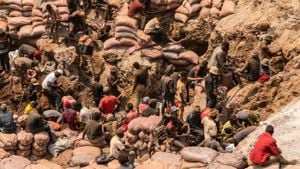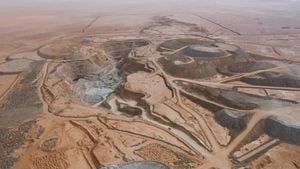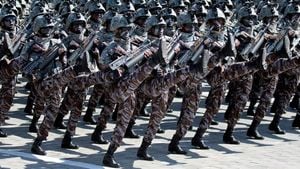Protests and consequent violence have erupted across Bangladesh, particularly following the allegations of attacks against minority groups during political upheaval this past August. Amid the chaos, the UN High Commissioner for Human Rights, Volker Türk, has launched a fact-finding mission to investigate these disturbing claims urging swift accountability for any reported abuses.
Following the demonstrations led by students, which resulted in the controversial ousting of Prime Minister Sheikh Hasina earlier this year, tensions escalated. The unrest peaked between August 5 and 15, coinciding with severe allegations of violence targeting various minority communities within the country.
At the heart of the investigation, Türk emphasized the importance of the Bangladeshi authorities conducting thorough inquiries to build trust with these minority groups. "It is valiant for the authorities to respond immediately to any incidents reported, holding the perpetrators accountable," stated Türk at his press conference. These remarks were made just days before the recent violent clashes instigated against the Jatiya Party’s headquarters — the third-largest political party founded by former military dictator H.M. Ershad.
The Jatiya Party had long stood as allies to Hasina’s Awami League, which governed Bangladesh for 15 years prior to the student-led protests demanding democracy. This alliance placed the Jatiya Party under scrutiny, drawing accusations of complicity with the regime and leading to calls for its destruction from anti-awami sentiments.
On the night of October 31, reports flooded media outlets of attackers torching the Jatiya Party offices located in Dhaka’s Bijoy Nagar area. The clashes saw attackers storm the premises, defying party members and eventually leaving the party headquarters engulfed in flames. Eyewitness accounts echoed through the news, highlighting the chaos and uncertainty circulating around these turbulent times.
According to Rashed bin Khaled, a Fire Service and Civil Defense official on the scene, firefighters rushed to combat the blaze, details on casualties remained unverified at the time. Still, Mujibul Haque Chunnu, the party’s secretary general, lashed out at the students, asserting, "People are watching what they are doing with us. It is live on social media ... they are doing it publicly, openly." Chunnu placed blame firmly on the protestors associated with the Anti-Discrimination Student Movement, led prominently by Hasnat Abdullah.
Abdullah’s outspoken leadership during these protests has become focal, with him labeling the Jatiya Party as "a national betrayer". His social media posts have rallied students to join him against the legacy of Hasina’s government. There's been growing concern about how quickly retaliatory violence could spiral out of control.
While the diminishing support for Hasina came after radical protests against her rule morphed late last summer, the subsequent revenge killings have resulted in hundreds of deaths — not only supporting her but also among students and security officials. With students now leading the interim government, exacerbated tensions serve as stark reminders of the volatile political climate.
Recognizing the growing crisis, Türk addressed not just the attacks on minorities but also the need for inclusive dialogue throughout this transitional phase. "Women must be at the center of social justice movements, especially during these times of upheaval. Their representation is not just necessary, but imperative," he emphasized during discussions about the current administration.
This inclusive vision also extends beyond gender representation. Türk advocates for the participation of ethnic and religious minorities in reforming governance structures. Echoing sentiments of solidarity, he remarked on the challenges inherited by the interim government. The issues are multifaceted, spanning economic, developmental, and civil rights — deeply entrenched challenges demand not only time but patience.
Türk’s mission is also focused on providing humanitarian assistance to the Rohingya refugees hosted by Bangladesh, as the crisis continues to demand international attention. Highlighting the burgeoning refugee situation originating from Rakhine State, he noted, "We are witnessing new arrivals to Bangladesh. The conditions here must remain secure to offer these displaced individuals safety and support. We must also step up efforts to garner international aid for both economic stability and support for these vulnerable populations."
Overall, as economic and social stability remain elusive amid rampant unrest, the fact-finding mission hints at the urgent necessity for Bangladesh's government to act decisively—to investigate reported abuses of human rights for the sake of restoring peace and safeguarding democracy.



